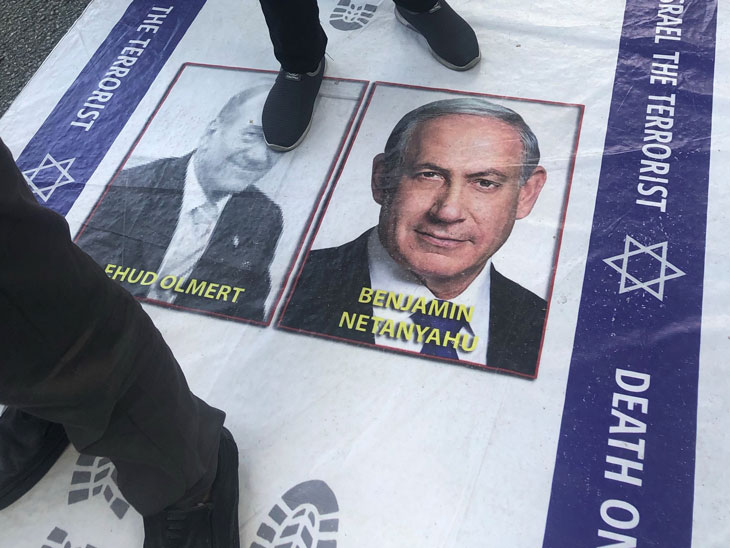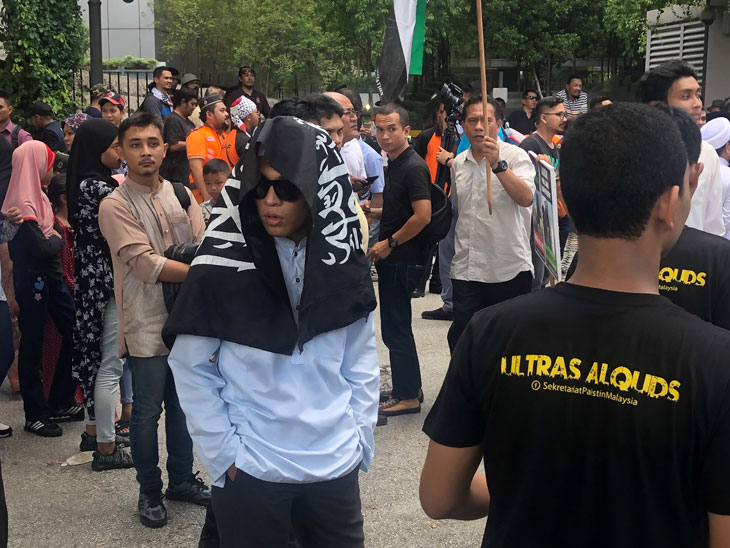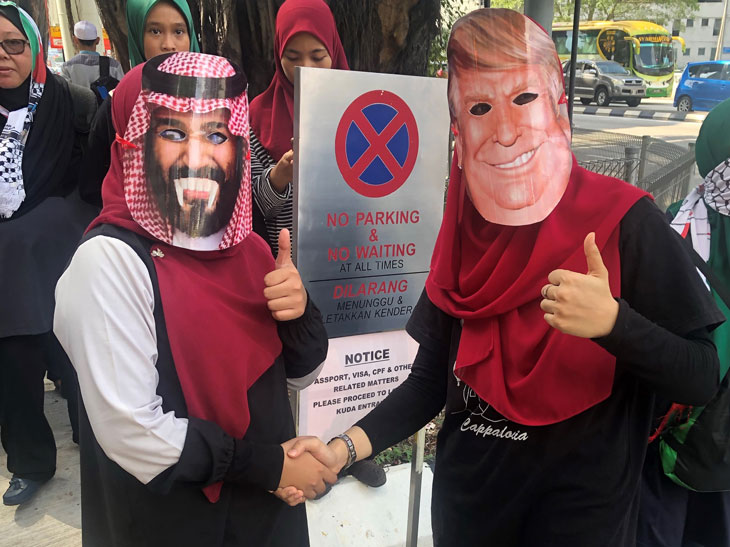
Published by EMIR Research, images from Julia Roknifard.
Every last Friday of the holy month of Ramadan marks an important occasion – the Al-Quds Day (the Day of Jerusalem), which is commemorated in different countries across the world, including Malaysia. This means that there will be demonstrations in major cities in front of Israeli embassies – where available – or otherwise in front of American diplomatic missions.
The Al-Quds day has its own anniversary this year – it was established by the founder of the Islamic Republic of Iran Ayatollah Khomeini in 1979 as an occasion to resist oppression, in this case – the oppression of Palestinians by the Israeli state and its supporters, primarily, the USA.
For decades, many major cities like Tehran, Jakarta, London and Berlin saw demonstrations of different intensities on the last Friday of Ramadan (or on the weekends afterwards for those who work and have no luxury of time for Friday prayer). However, not unlike in Malaysian politics, many things got mixed up in what meaning people ascribe to this day.

The struggle of Palestinians for having sovereignty to rule over their own land has been reinterpreted to serve the interests of outsiders. For example, the Palestinian cause was a national struggle at first, but with the effort to gain support of the ummah, was given a flavor of the Muslim struggle, regardless of the strong and nationalistic Christian minority living in Palestine. In that case, another confusion arouse – if it is a struggle, who is the adversary to the Palestinians? Jews – in terms of religious affiliation – or Zionists as the proponents of the Israeli state as a separate sovereign entity?
Throughout the years that have passed since the establishment of Israel in 1948, many thinkers tried to remind the world about the need to draw a line between the two: a Jew as an ethnic and religious identity while a Zionist is a proponent of the Israeli state, who is not necessarily a religious person (just to recall, founding fathers of the Israeli state Theodore Herzl, Max Nordau, Chaim Weizman or Ze’ev Jabotinsky were all vocal atheists).
This year, on the eve of Al-Quds Day, German Anti-Semitism Commissioner Felix Klein called Germans to wear the Jewish skullcap “kippa” in support of the Jews, after being criticized for controversially urging the Jews not to wear the kippa instead, out of security concern. A typical example of confusion between the religious, national identity and their manifestations.
The confusion about labeling Al-Quds Day as a Muslim struggle for their land against the Jewish occupants is well debunked by the members of some demonstrations. In London, one can see Muslims from various origins and walks of life, including those carrying Hezbollah’s or Hamas’s banners, as well as secular activists and the Jewish Orthodox, some of whom also believe that Israel should not have been established forcefully by people, but only by God’s will when the time comes.
In Malaysia, the composition of those gatherings is more homogenous, represented by Muslims and sometimes supported by members of Muslim majority political parties – after all, it would be a shame for them to miss another playground to strengthen the identity cause in the eyes of voters.
Another confusion, not totally groundless, is that the commemoration is totally an Iranian thing promoting an Iranian agenda. While Al-Quds Day is strongly associated with Iran by virtue of the first demonstrations to be held there, and even now demonstrators elsewhere opting for the Persian chanting “marg bar Israel, marg bar Amrika” (“down with Israel, down with America), it, indeed, spilt beyond the borders of its origin. Of course, Tehran is glad to look like a champion to this cause, especially now, when the pressure from the US and its neighbors is high as ever. It will also be the largest organizer of rallies as more than 900 cities across the country will have it. At the same time, for rally participants around the world, less numerous than in Iran itself, this day became another occasion to channelize their grievances of various kinds.
For the past year, Middle Eastern Trumpo-policy trampled over the UN resolutions and transferred the US embassy to Jerusalem, acknowledged the Israeli occupation of the Golan Heights to be legal and just earlier in May claimed to consider anti-Zionism as a part of anti-Semitism. The latter erodes the boundary between the two social phenomena as it is now will be seen in the official American interpretation, and thus, will unleash the leverage against the countries with an anti-Zionist stance, like Malaysia with the return of Mahathir.

For this year, the leaders of the Iranian Islamic Revolutionary Guard Corps (in April this year listed by the US as a foreign terrorist organization), Hezbollah and Hamas suggested a slogan “no to the deal of the century”, meaning the Middle East peace plan devised by Trump’s son-in-law Jared Kushner. The US scheduled the presentation of it at a conference in Bahrain on 25-26 June, and from what appeared from the earlier leaks, the “deal of the century” is going to be skewed in favor of Israel.
China and Russia already announced their decision to boycott the meeting – their own input into Al-Quds cause of sorts, for the reasons they deem right.
After just dipping into complexity of the Al-Quds Day interpretation, the question remains: how conscious are those marching for Palestine of the sophisticated struggle, thoughts, politics and aspirations on both sides? Is the Palestinian issue a question of national or religious identity for them or an expression of empathy towards the nation which is aspiring for justice and sovereignty?
For some angry Malaysians who came to rally against Putrajaya’s accession to the Rome statute this April, while instigated by the claims that the rights of Malays, Muslims and royalty are under threat, the event again became a channelization of other grievances that were even more mundane. Isn’t it the same as what is happening to the meaningful, emotionally nurtured occasions like Al-Quds day – to mobilize political support for certain forces by banking on an idealist cause?
The Al-Quds Day narrative is a call of justice and standing against an oppressor – which can be, in fact, extended to various issues and regional cases. Mere channelization of anger into the US embassy where the rally participants walk to from Tabung Haji after Friday prayers united by the sense of Muslim brotherhood, opens the door to manipulation with people’s minds. It would be better if, instead of putting the blame on someone, people would reflect on the underlying causes of unjust systems. Sometimes the governments need to hear the crowd, the louder – the better, but this is probably the case when change requires the crowd to get smarter.
Julia Roknifard is Director of Foreign Policy at EMIR Research, an independent think-tank focused on strategic policy recommendations based upon rigorous research.

